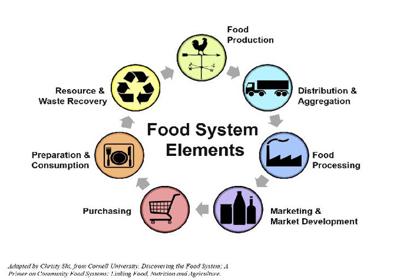ONE of the few areas of the global economy that is growing is the agriculture and food sector.
It is anticipated to stay that way due to significant underlying growth factors like population, urbanisation, and the rising of the middle classes.
Since food security is at the top of government agendas, there is considerable political support in addition to the economic fundamentals.
The industry is also dealing with issues brought on by the fast advancement of technology, the need for biofuels, increased information availability, and climate change.
Throughout the value chain, these factors are becoming more apparent in the form of increased volatility, complexity, and scrutiny.
The food system
Systems have a purpose or function and are made up of components and linkages. Food systems include all of the players and their interconnected value-adding activities that go into producing, gathering, processing, distributing, consuming, and discarding food goods.
All food items derived from forestry, fisheries, aquaculture, and crop and livestock production, as well as the larger ecological, social, and economic contexts in which these various production systems are situated, are referred to as food systems.
Provision of inputs and services in the extended value chain, which facilitate (or impede) the movement of goods through the various phases of the core value chain, is another activity included in the food system.
Research driven changes
Drought-tolerant seeds, researchers looking into climate-smart agriculture interventions, extension services to support climate-smart agriculture, low-carbon machinery, and climate insurance are a few examples of these varied inputs and services.
The natural and social context in which food production systems are situated creates the enabling environment that shapes food systems and will have an impact on the development and adoption of interventions related to climate-smart agriculture.
The general public’s perspective of climate change, particular national strategies for adaptation and mitigation (such as Intended Nationally Determined Contributions), and international agreements like the Paris Climate Agreement are examples of societal aspects.
The management of natural resources (such as land, soil, water, and genetic variety) and other natural processes—particularly those related to climate—are crucial components of the enabling environment for the development of sustainable food systems.
In order to be considered sustainable, food systems and the sustainable food value chains (SFVCs) they are a part of must be profitable, socially and environmentally sustainable, meaning they benefit society as a whole, and environmentally sustainable, meaning they have no negative effects on the environment.
The food value chain
To find the core reasons of system failures, including the places where food systems are exposed to climate threats and where inefficiencies result in excessive greenhouse gas emissions, it is essential to comprehend food systems and apply systems thinking.
The core value chain, the extended value chain, and the enabling environment are the three interacting levels at which climate change adaptation and mitigation strategies may be introduced.
Using a systems approach, one can identify vulnerabilities and develop resilience solutions by looking at how all the food value chains interact within the relevant food system.
For instance, highly interconnected systems that depend excessively on a small number of staple crops from a small number of producing locations are particularly vulnerable.
However, increasing national food basket diversification, increasing on-farm diversity, and expanding the number of locations with diverse food baskets might significantly boost the resilience of global food systems. Food systems interact with other systems (such as energy, trade, and health) and are made up of subsystems (such as agricultural, market, waste management, and input supply systems).
As a result, modifications to one system may lead to fundamental changes in the food chain.
For instance, investments in food systems may be impacted by a shift in political leadership. Food systems will probably be significantly impacted by policies that support biofuels in the energy system.
Riyadh Mohammed
(LLM, MBA, MSC, BSC, DIP) is an agricultural consultant






